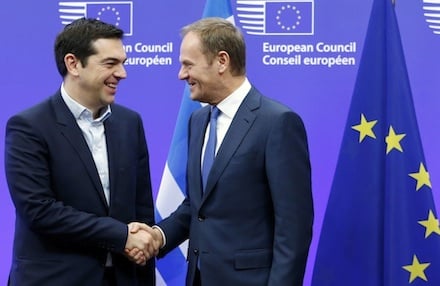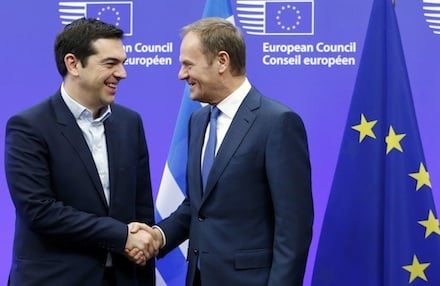Greece and the European Central Bank are currently at loggerheads. The new Greek government wants to lighten its debt burden but the ECB won’t give the Greeks everything they want. Only two weeks into Syriza’s governance of Greece, the ECB has decided to play hardball, deciding that Greek government debt may no longer be used as collateral for monetary policy operations. While the ECB thought it was playing a strong hand with that move, it may end up coming back to haunt them.
That one move reduces the market demand for Greek debt. Yields will begin to rise, and the spread between Greek debt and other Eurozone countries’ securities will increase. Remember the great benefit of the euro to the peripheral European countries: all sovereign debt was treated equally by markets because it was assumed that the ECB would ensure that creditors would not suffer losses in the event that there were any difficulties with a Eurozone country servicing its debt. That enabled Italy, Spain, and Greece, among others, to borrow money at rates close to what Germany could, rates far lower than the peripheral countries had historically been able to reach.
Naturally they took advantage of that, overspent, and found themselves in difficulty. But the ECB’s bailout of Greece assuaged investors’ fears, and the spreads between peripheral debt and core Eurozone debt began to narrow again. With this latest move by the ECB, the risk is that the spread will widen with respect to Greek debt. If Greece no longer has the advantage of being able to borrow at low rates, then what good is the euro to them? Why not go back to the drachma? At least then they are in control of their own monetary policy.
The Greek people haven’t taken kindly to the lecturing they’ve received from the ECB, the IMF, and the German government, no matter how correct some of that lecturing may have been. They are tired of foreigners telling them what to do, which is why they elected this new government, headed by Syriza. Had the ECB waited until Syriza was longer-entrenched in power, even a few months, then this hardball tactic might have been more effective. But challenging an upstart anti-bailout government while they’re still basking in the afterglow of their victory is idiotic. Now that they’ve been challenged, the electorate will want them to tell the Germans and the ECB to pound sand. And if Syriza does tell the ECB to get lost, they might just drop the euro and return to the drachma for good measure.
What happens if this much-feared “Grexit” takes place? Well, for Greece, there could be a penalty in debt markets. While the government likely wouldn’t repudiate its euro-denominated debt, they would likely repay them with drachmai. Markets probably wouldn’t trust the new government not to devalue the currency, so the exchange rate of the drachma might not be favorable to the government, but that might be a risk they’re willing to take in order to control their own monetary policy and get out from under the ECB’s thumb.
Where things really get tricky is with the euro. Investors have been willing to purchase Eurozone debt because they have been assured that no country will leave the euro, so they will always be repaid in euros when they redeem their bonds. Greece leaving the euro would throw those assurances out the window. Who’s to say that Italy or Spain might not leave next? Investors would be much more wary, and less willing to buy low-yield Eurozone debt. Eurozone bond yields would rise and the euro, battered downwards by the combination of the ECB’s quantitative easing and the increased mistrust in the ECB for allowing the Grexit to occur, would continue to weaken.
European banks and corporations still hold significant amounts of dollar-denominated debt, and servicing that debt would now require them to sell a lot more euros to get those dollars. Having paid negative interest rates for months, their euro balances are shrinking and they might not have enough euros to get dollars and would risk defaulting on that dollar-denominated debt. The Federal Reserve would step in and re-open its swap lines with the ECB. Remember that during the height of the financial crisis, the swap lines were on the order of nearly $600 billion, almost as much as the Treasury’s bank bailout that so incensed American voters in 2008.
The ECB would create euros and send them to the Fed, the Fed would create dollars and send them to the ECB, and the ECB would loan those dollars to firms that need them. The hope is that you save the firms, they repay the loans, and the whole trade unwinds over time. If they go under, you’ve got problems. But once again the Fed might end up getting involved in bailing out Europe, and most likely to the tune of hundreds of millions of dollars. Something on the order of the Grexit would also almost certainly mean that there would be no Fed rate hike, and might even spur the Fed to engage in additional easing, such as purchasing Eurozone government securities to try to drive down Eurozone bond yields. Then the Fed would be actively involved in trying to prop up not just the US economy but the European economy as well. To quote Bart Simpson: Ay caramba!
While this is all just speculation, and hopefully will never occur, keep this possible scenario in the back of your mind as you read about the negotiations between the ECB and the Greek government. If you treat other governments as though they’re little children, don’t be surprised if they throw a tantrum and melt down. The ECB thinks that it can talk down to the Greeks and can use membership in the euro as a carrot to entice the Greeks while they whack them with sticks to get them to do what they want to do. But if the Greeks are no longer interested in the carrot, then the ECB has massively miscalculated and shot itself in the foot.
Reprinted with permission from the Carl Menger Center.


